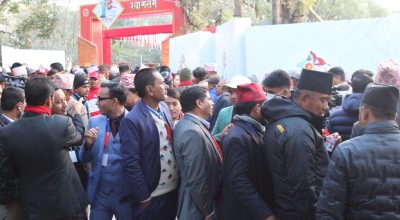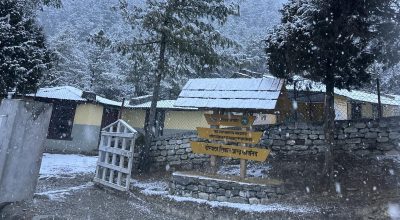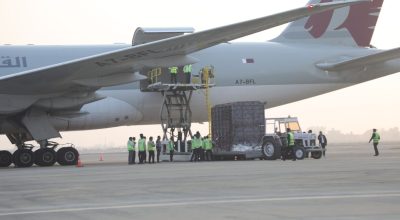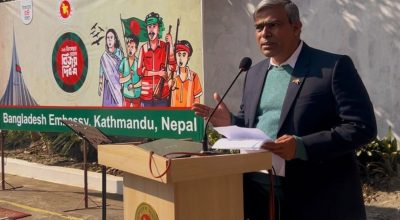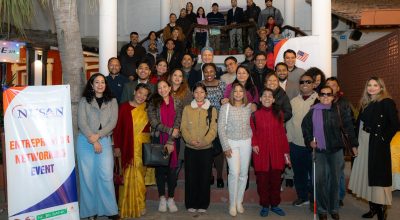
Kathmandu, April 19: “Time has changed this year. Our students are getting textbooks in time. The textbooks have already been loaded from the depot. Most probably we will get books on coming Friday,” Bal Krishna Dangi, the Headmaster of Shree Adarsha Higher Secondary School in Juphal, Dolpa, told RSS over the phone sharing his excitement after the confirmation of timely supply of books.
Such elations from the academic fraternity are coming from across the country in the recent days after the government’s positive interventions for timely printing and supply of textbooks yielded fruition. Up to the secondary-level school education, new academic session has started across the country but the schools are yet to commence their regular classes since the school administrations are required to carry out their some formalities for student enrollment and other administrative preparations.
In the yesteryears, there used to be several reports on unavailability of the books and stationeries even in the cities, let alone the remote and mountainous districts. The students had to wait until the mid-term exams — in the worst case even up to the final exams — to get books, which led to poor academic achievements of the students. Worse still, the students were forced to take their exams without seeing textbooks.
However, the story of the past years has been blurred this year. Those are the stories of the past for now. There are reports that almost all the remote districts from Kalikot of Karnali Province to Khotang of Koshi and Gorkha of Gandaki districts received books for the community schools. This time students from almost all community schools across the country have already bagged text books, which some argue that this is the first of its kind success since when the government promised to supply the school textbooks. This has given a sigh of relief to the teachers, guardians and government officials while delight to the students for having books in hand in time.
Santosh Acharya, the Headmaster of Machhapuchchhre Higher Secondary School in Machhapuchchhre Rural Municipality from Kaski told RSS over phone that teaching-learning activity, evaluation process, and rest of the teaching things will be ‘standard’ on our context after the supply of books.
“Our academic calendar will be disturbed as we cannot conduct examinations and our psychology is shaped in such a way that books are all in all for our academic achievements,” Acharya observed.
Textbooks are also important because in most of the rural areas, we have failed to ensure the efficient, qualified and trained subject teachers. In this context, a teacher having command over a different subject has to teach another subject despite her/his limited knowledge. So, the textbooks are boon for students and teachers in such a circumstance.
If the textbooks are timely available, it will have a positive effect on a student’s psychological well-being and academic performance, a Visiting Faculty at School of Education in Kathmandu University Chiranjivi Baral said, adding that with the timely availability of textbooks, students will have reduced stress and anxiety caused by the fear that they will fall behind in their studies.
According to the Janak Education Material Centre (JEMC), the sole institution in the country that is entrusted with the responsibility to supply the community school textbooks, stated that textbooks are likely to be dispatched to all schools within a week.
This all became possible with the concerted efforts of the stakeholders, government’s unhindered support, regular monitoring of the progress and supervision.
It is said that Prime Minister Pushpa Kamal Dahal ‘Prachanda’ himself was seriously keeping his eyes vigil on the progress since he had made public statements time and again about the timely supply of books for the community schools.
“The Prime Minister’s constant concerns over the timely supplies of textbooks also played a role for making it possible. This is the time that students could get textbooks on time after the 1990’s multiparty movement,” JEMC Managing Director Anil Kumar Jha told RSS. In order to facilitate the printing of the textbooks, the government took help from the private sector for printing the textbooks upto to grade five while the JEMC printed the books from class six to ten for the academic year 2080 BS.
Baral was of the view that it also increases the level of their confidence in doing better in their studies and improves the academic performance of students because they are more engaged in learning as they can read ahead, which helps them to participate in classroom discussions and raise questions. “Higher engagement in learning ensures better learning outcomes. With the textbooks in hand, teachers can begin teaching learning activities on time, creating ample opportunities for students to learn,” Baral argued.
Acharya, who is leading one of the best community schools in Gandaki Province, added that our teachers, students and parents are solely dependent on textbooks given our more focus on lecture method in teaching. At times, the students write on their textbooks too and practice while teachers too depend on books to interact with the students.
Actually, our system has no other tools to teach the students except the textbooks. Meaning, the books are sole package for both teachers and students. Therefore, this is truly a commendable job that the government and authorities performed this year. Now onwards, supply of textbooks should be considered a top priority of the state mechanisms and the province and local level governments should also be mobilized to facilitate this process. Lack of textbooks in hand should be made the story of the history.RSS





